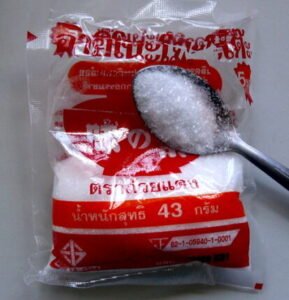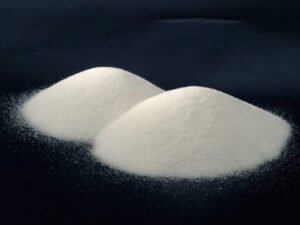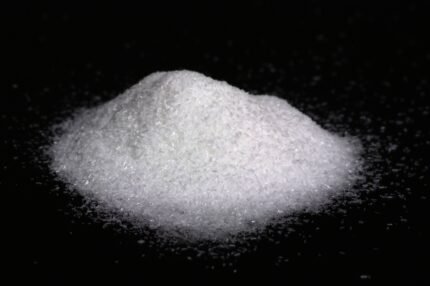Medically reviewed by Dr. Ramesh Gaddam, M.D. — Written by Sumalatha, D.N.H.E
MSG stands for monosodium glutamate. It is a flavor enhancer commonly used in cooking to add a savory or umami taste to dishes. MSG is the sodium salt of glutamic acid, an amino acid found naturally in foods like tomatoes, cheese, and mushrooms.
It’s often used in Asian cuisine but can also be found in processed foods, soups, snacks, and restaurant dishes. Despite some controversy surrounding its safety, MSG is generally recognized as safe by regulatory agencies when consumed in typical amounts.
Nutrition of MSG

Monosodium glutamate (MSG) is primarily used as a flavor enhancer rather than as a source of nutrition. It is low in calories and contains only trace amounts of other nutrients.
| Nutrient | Amount per 1 teaspoon (4.8g) |
|---|---|
| Calories | 12 |
| Protein | < 1g |
| Fat | 0g |
| Carbohydrates | < 1g |
| Sodium | Approximately 1.9g |
Please note that the sodium content is provided in grams for clarity, but it’s more commonly expressed in milligrams, which would be approximately 780 mg per teaspoon of MSG.
Benefits of MSG
Monosodium glutamate (MSG) is primarily known for its ability to enhance the flavor of foods, particularly by imparting a savory or umami taste.

While it has been the subject of controversy and misinformation, scientific research suggests that MSG can offer several benefits when used responsibly:
- Flavor Enhancement
- Reduction of Sodium
- Decreased Food Waste
- Vegetarian and Vegan Cooking
- Improved Palatability of Healthier Foods
- Time-Saving
Flavor Enhancement
MSG enhances the natural flavors of foods, making them taste more savory and delicious.
It can improve the overall taste of dishes without adding a distinct flavor of its own.
Reduction of Sodium
By using MSG to enhance flavor, chefs and home cooks can reduce the need for excessive salt in recipes.
This can be particularly beneficial for individuals who need to limit their sodium intake due to health concerns like high blood pressure.
Decreased Food Waste
Foods enhanced with MSG may have a more appealing taste, which can reduce the likelihood of leftovers being wasted.
This can be especially helpful in commercial food preparation where minimizing waste is important for economic and environmental reasons.
Vegetarian and Vegan Cooking
Since MSG is derived from plant-based sources and does not contain animal products, it can be a useful tool for enhancing the flavors of vegetarian and vegan dishes, making them more satisfying and flavorful.
Improved Palatability of Healthier Foods
Foods that are naturally lower in fat, such as vegetables, grains, and lean proteins, can sometimes lack flavor compared to higher-fat options.
Adding MSG can make these healthier options more appealing, encouraging people to consume them more regularly as part of a balanced diet.
Time-Saving
MSG can help streamline the cooking process by intensifying flavors more quickly than traditional methods, reducing the need for lengthy cooking times or complex seasoning combinations.
Caution
It’s important to note that while MSG can provide these benefits, it should still be used in moderation, as excessive consumption of sodium, regardless of its source, can have negative health implications.
Additionally, some individuals may be sensitive to MSG and may experience symptoms like headaches or nausea, although scientific evidence does not support claims of widespread sensitivity to MSG.
As with any food additive, it’s essential to be mindful of individual tolerance and preferences.
Uses of MSG
MSG, or monosodium glutamate, is commonly used as a flavor enhancer in various culinary applications. Here are some of its uses:

- Cooking
- Food Manufacturing
- Restaurant and Food Service
- Home Cooking
- Vegetarian and Vegan Cooking
- Flavor Enhancement in Healthier Foods
- Culinary Innovation
1. Cooking:
MSG is often used as a seasoning to enhance the flavor of a wide variety of dishes, including soups, stews, stir-fries, marinades, sauces, and gravies.
It is sometimes included as an ingredient in spice blends or seasoning mixes to add depth of flavor.
2. Food Manufacturing:
MSG is commonly used in the production of processed foods such as snacks, canned soups, frozen meals, salad dressings, sauces, and packaged seasoning mixes to improve taste and palatability.
It may also be found in condiments like ketchup, mustard, mayonnaise, and barbecue sauce.
3. Restaurant and Food Service:
Many restaurants and food service establishments use MSG as a flavor enhancer to improve the taste of their dishes.
MSG is frequently used in Asian cuisine, particularly Chinese, Japanese, Korean, and Vietnamese dishes, to enhance umami flavors.
4. Home Cooking:
MSG is available as a standalone seasoning and is commonly used by home cooks to enhance the flavor of homemade meals.
Some chefs and home cooks experiment with MSG in various recipes to explore its flavor-enhancing properties.
5. Vegetarian and Vegan Cooking:
MSG can be used to add savory flavor to vegetarian and vegan dishes that may lack the umami taste typically found in meat-based dishes.
6. Flavor Enhancement in Healthier Foods:
MSG can improve the taste of foods that are naturally lower in fat or sodium, making them more palatable and enjoyable to consume.
7. Culinary Innovation:
Chefs and food innovators sometimes use MSG in innovative ways to create new flavor profiles or elevate the taste of traditional dishes.
While MSG can enhance the flavor of foods, it’s essential to use it in moderation, as excessive consumption of sodium can have adverse health effects, particularly for individuals with certain health conditions like high blood pressure.
Additionally, some individuals may be sensitive to MSG and may experience symptoms such as headaches or nausea, although scientific evidence does not support claims of widespread sensitivity to MSG.
Conclusion
It’s important to note that the majority of people can consume MSG without experiencing any adverse effects. Furthermore, scientific research has not consistently supported the existence of widespread sensitivity to MSG.
Many of the reported symptoms may be attributed to other factors, such as individual sensitivities to certain foods or ingredients, psychological factors, or the consumption of high-fat or high-sodium meals commonly associated with foods containing MSG.
If you suspect that you are sensitive to MSG or experience any of the aforementioned symptoms after consuming foods containing MSG, you may consider reducing your intake or avoiding it altogether.
Additionally, consulting with a healthcare professional can help determine the underlying cause of your symptoms and provide appropriate guidance.
MSG Taste
MSG, or monosodium glutamate, is known for enhancing the umami taste in foods.
Umami is considered the fifth basic taste alongside sweet, salty, sour, and bitter.
It’s often described as a savory or meaty flavor.
When added to dishes, MSG doesn’t have a distinct taste of its own but rather enhances the existing flavors in the food.
It boosts and enriches the overall taste, making dishes more savory, delicious, and satisfying.
In essence, MSG enhances the perception of flavors in foods, making them taste more robust and flavorful without overpowering or altering the original taste of the ingredients.
It particularly complements savory dishes and can elevate the taste of a wide range of cuisines, from soups and stir-fries to sauces and marinades.
MSG Allergy
MSG allergy, also referred to as MSG sensitivity or MSG symptom complex, is a term used to describe adverse reactions some individuals may experience after consuming foods containing monosodium glutamate (MSG).
It’s important to note that while some people report symptoms after consuming MSG, scientific research has not consistently supported the existence of a true allergy to MSG.
Symptoms associated with MSG sensitivity
Symptoms associated with MSG sensitivity may include headaches, flushing, sweating, numbness or tingling, chest pain, nausea, weakness or fatigue, and palpitations.
However, these symptoms are not specific to MSG and can be caused by various factors.
If you suspect you have a sensitivity to MSG, it’s essential to speak with a healthcare professional for proper evaluation and guidance.
They can help determine the underlying cause of your symptoms and provide appropriate recommendations, which may include dietary adjustments or further testing to identify any potential triggers.
Does MSG have Gluten?
MSG (monosodium glutamate) is gluten-free.
MSG, or monosodium glutamate, is a flavor enhancer derived from glutamate, which is an amino acid.
It is chemically synthesized through fermentation of starches, sugar beets, sugar cane, or molasses, and it does not contain gluten.
Gluten is a protein composite found in wheat, barley, rye, and their derivatives. Since MSG is not derived from gluten-containing grains, it is inherently gluten-free.
Potential Risks of Gluten Contamination
However, it’s essential to note that while pure MSG does not contain gluten, it’s always essential to check labels on packaged foods to ensure they are gluten-free.
MSG may be present in products that contain gluten as an ingredient or due to cross-contamination during manufacturing processes.
If you have concerns about gluten in foods containing MSG, it’s best to consult the product labels or contact the manufacturer to confirm the gluten-free status of the product.
MSG Substitute
If you’re looking for substitutes for MSG in cooking to enhance flavor, there are several options you can consider.
While none of these options will precisely replicate the taste of MSG, they can help enhance the umami flavor in dishes. Here are some alternatives:
Mushrooms:
Mushrooms contain natural glutamate, the same compound found in MSG, which contributes to their savory flavor. Adding mushrooms or mushroom powder to dishes can enhance umami.
Tomatoes:
Tomatoes are another source of natural glutamate. Tomato paste, sun-dried tomatoes, or even ripe fresh tomatoes can be used to add depth of flavor.
Parmesan Cheese:
Parmesan cheese is rich in glutamate and adds a savory taste to dishes. Grated Parmesan can be sprinkled over various dishes to enhance flavor.
Soy Sauce:
Soy sauce is a fermented condiment that contains glutamate and adds a rich umami flavor to dishes. Use it sparingly to avoid making the dish too salty.
Fish Sauce:
Fish sauce is another fermented condiment that provides a strong umami flavor. It’s commonly used in Southeast Asian cuisine.
Miso Paste:
Miso paste, made from fermented soybeans, is rich in umami flavor and can be used to add depth to soups, marinades, and sauces.
Dried Seaweed:
Kombu, a type of dried seaweed commonly used in Japanese cuisine, contains glutamate and can be used to make dashi broth, which adds umami to various dishes.
Nutritional Yeast:
Nutritional yeast is a deactivated yeast commonly used as a cheese substitute in vegan cooking. It has a cheesy, savory flavor and can be sprinkled on dishes for added umami.
Flavorful Herbs and Spices:
Dried shiitake mushrooms can be ground into a powder and used as a seasoning to enhance umami flavor.
Dried kelp can be ground into a powder and used as a seasoning to add umami to dishes.
These alternatives can help enhance the flavor profile of your dishes without the use of MSG. Experiment with different combinations to find what works best for your taste preferences and dietary needs.
Frequently Asked Questions?
Is MSG Bad for Your Brain?
There is no conclusive evidence to suggest that MSG is inherently bad for the brain.
While some people may experience adverse reactions such as headaches or migraines after consuming MSG, scientific research has not consistently supported claims that MSG directly harms the brain.
Is MSG Bad for Your Heart?
There is limited evidence to suggest that MSG is directly bad for the heart.
However, consuming high amounts of MSG may contribute to an increase in sodium intake, which can lead to high blood pressure in individuals who are sensitive to sodium.
High blood pressure is a risk factor for heart disease. Therefore, it’s essential to consume MSG in moderation, especially for individuals with hypertension or other heart-related conditions.
Long-Term MSG Side Effects
Long-term effects of MSG consumption have not been extensively studied, and there is limited evidence to suggest significant long-term side effects.
However, excessive intake of MSG, especially in combination with a high-sodium diet, may contribute to health issues such as hypertension, obesity, and metabolic syndrome over time.
More research is needed to fully understand the potential long-term effects of MSG consumption.
What Is MSG Made Of?
MSG, or monosodium glutamate, is typically produced through a fermentation process using starches, sugar beets, sugar cane, or molasses.
Glutamate, the active component of MSG, is an amino acid naturally found in foods such as tomatoes, cheese, and mushrooms.
During the fermentation process, glutamate is isolated and combined with sodium to form monosodium glutamate.
The final product is a white crystalline powder with a savory taste, commonly used as a flavor enhancer in cooking.
What Does MSG Do to Your Body?
MSG, or monosodium glutamate, is a flavor enhancer that works by stimulating the umami taste receptors on the tongue.
When consumed in moderate amounts, MSG is generally recognized as safe by regulatory agencies and is metabolized by the body like other amino acids.
For most people, MSG consumption does not cause any noticeable effects.
However, some individuals may experience adverse reactions, commonly referred to as “MSG symptom complex.”
These reactions may include headaches, flushing, sweating, numbness or tingling, chest pain, nausea, weakness or fatigue, and palpitations.
It’s important to note that these symptoms are not experienced by everyone, and the scientific evidence supporting widespread sensitivity to MSG is limited.
Does MSG Cause Diarrhea?
There is limited scientific evidence to suggest that MSG directly causes diarrhea.
While some individuals may experience gastrointestinal discomfort after consuming foods containing MSG, such as nausea or bloating, diarrhea specifically is not commonly reported as a side effect of MSG consumption.
Other factors in the diet or individual sensitivities may be contributing factors to gastrointestinal symptoms.
Does MSG Raise Blood Pressure?
MSG consumption, particularly in large amounts, may contribute to an increase in sodium intake, which can lead to high blood pressure in individuals who are sensitive to sodium.
High blood pressure is a risk factor for heart disease. Therefore, it’s essential to consume MSG in moderation, especially for individuals with hypertension or other heart-related conditions.
However, the direct effect of MSG on blood pressure is still a topic of debate among researchers, and individual responses to MSG may vary.
Does MSG Cause Migraines?
While some individuals report experiencing migraines or headaches after consuming foods containing MSG, scientific research has not consistently supported a direct causal link between MSG and migraines.
The phenomenon of headaches or migraines attributed to MSG consumption is often referred to as “Chinese restaurant syndrome” or “MSG symptom complex.” Many factors may contribute to migraines, including genetics, dietary triggers, stress, and hormonal changes.
Therefore, it’s essential to consider individual sensitivities and triggers when managing migraine symptoms. If you suspect that MSG may be a trigger for your migraines, you may consider avoiding foods containing MSG and monitoring your symptoms to determine any potential associations.
Medically reviewed by Dr. Ramesh Gaddam, M.D.

General Physician, Diabetologist, and Critical Care Specialist.
Discover more from Health Build-Up
Subscribe to get the latest posts sent to your email.







